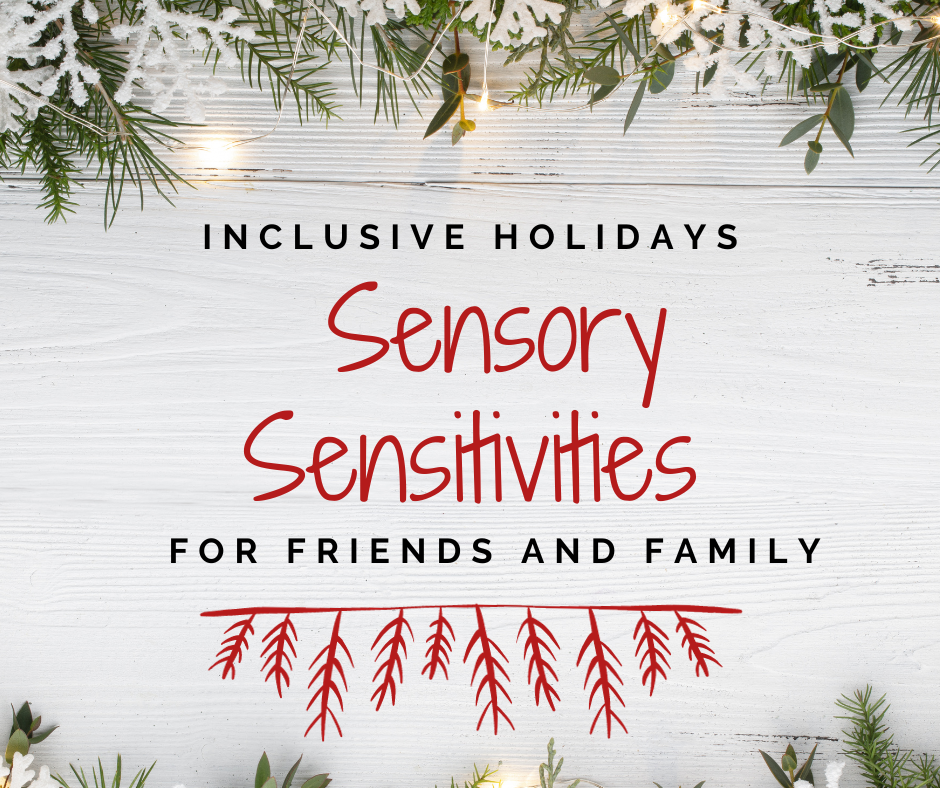 Depending on our disability, some of us might be more sensitive to things such as scent, texture, and noise. Generally, holiday decorating is synonymous with scents of balsam and fir, oak and musk, cinnamon, and clover. There can be different food and textures or strong scents involved with cooking. Holiday lighting, often blinking, adorns houses and trees on the inside and outside. We often do not realize that some of the things included in our decorating, food, or homes can become overwhelming for some people. In general, the holidays and the environments they are celebrated in can become over-stimulating for people with sensory sensitivities.
Depending on our disability, some of us might be more sensitive to things such as scent, texture, and noise. Generally, holiday decorating is synonymous with scents of balsam and fir, oak and musk, cinnamon, and clover. There can be different food and textures or strong scents involved with cooking. Holiday lighting, often blinking, adorns houses and trees on the inside and outside. We often do not realize that some of the things included in our decorating, food, or homes can become overwhelming for some people. In general, the holidays and the environments they are celebrated in can become over-stimulating for people with sensory sensitivities.
Sometimes sensory overload can feel like heightened anxiety. It may make someone feel they need to leave a situation or celebration. Often when anxiety is high, folks could have difficulty communicating. As people with sensitivities, we may struggle with certain sounds, textures, smells, lighting, or clothing – it’s not always only one sensitivity. We may use stimming to keep sensory systems in balance. This means we may rely on repetitive movements, sounds, and fidgeting to block out the stress of uncomfortable environments.
While holding our holiday events this year, check in with guests to see what kind of accommodations they may need. Along with physical accommodations, our friends and family may need a soothing environment or certain items to fidget with. We can also ask if they are sensitive to scents or sounds, have difficulty with different lighting, overcrowding, sharing small spaces, or have a preference for the utensils that are used for eating.
Let’s dive into some tips to help make our holiday gatherings more inclusive for everyone.
- Create a quiet and safe sensory area in the home or space where you are gathering.
- Encourage guests to bring fidget items or provide ones if you can.
- Reduce and dim lighting and avoid fluorescent lights. Light covers are available to purchase if you are unable to dim lights.
- Consider not using blinking lights.
- Allow guests to bring ear plugs or provide some if needed.
- Avoid strongly scented items such as candles, room spray and incense. Sometimes food preparation may produce a strong smell. If someone shares their concern about a certain smell, politely listen to their needs and make the appropriate adjustments.
- Reduce cramped and confined space by removing or arranging furniture in a way that is open and clear.
- Provide food options that avoid strong flavors or textures.
- Encourage self-advocacy, allowing people to speak up about their needs.
As a community, let’s practice radical hospitality, encourage guests to feel as comfortable as possible by providing the appropriate accommodations folks need is one step in making our holidays inclusive. Along the way, we may learn new ideas or discover what is sensitive to others. Taking the time to accommodate, learn, and create inclusive gathering spaces allows us to connect with family and friends. It’s our time to celebrate together and ensure we are the best host possible, by doing what we can to accommodate those we love.
For more information about neurodiversity, check out these additional resources: